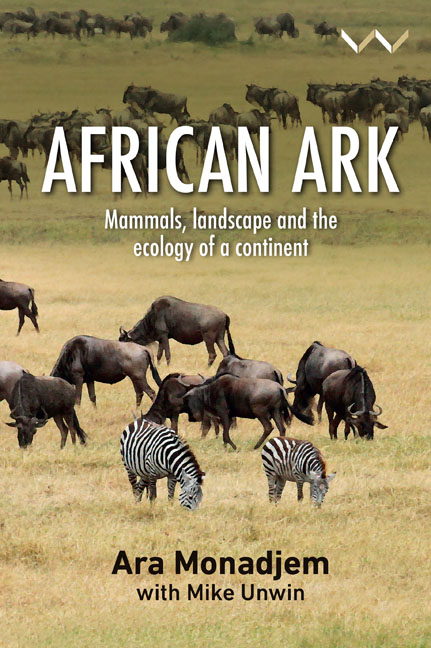Book contents
- Frontmatter
- Dedication
- Contents
- List of Plate Photographs
- List of Figures and Tables
- Acknowledgements
- Foreword
- Preface
- Chapter 1 A Continent of Plenty
- Chapter 2 The Species Conundrum
- Chapter 3 The History of Africa’s Mammals
- Chapter 4 Islands as Species Factories
- Chapter 5 Evolution on the African Mainland
- Chapter 6 Giant Mammals Shaping the Landscape
- Chapter 7 A Place for Every Species
- Chapter 8 Fluctuating Populations
- Chapter 9 The Human Factor
- Chapter 10 The Sinking Ark?
- Glossary
- Notes
- References
- Recommended Reading
- Index
Chapter 9 - The Human Factor
Published online by Cambridge University Press: 29 November 2023
- Frontmatter
- Dedication
- Contents
- List of Plate Photographs
- List of Figures and Tables
- Acknowledgements
- Foreword
- Preface
- Chapter 1 A Continent of Plenty
- Chapter 2 The Species Conundrum
- Chapter 3 The History of Africa’s Mammals
- Chapter 4 Islands as Species Factories
- Chapter 5 Evolution on the African Mainland
- Chapter 6 Giant Mammals Shaping the Landscape
- Chapter 7 A Place for Every Species
- Chapter 8 Fluctuating Populations
- Chapter 9 The Human Factor
- Chapter 10 The Sinking Ark?
- Glossary
- Notes
- References
- Recommended Reading
- Index
Summary
For much of this book we have discussed life on Earth as if humans were not part of it. This somewhat bizarre attitude is relatively common among ecologists, whose aim is to study animals in their natural habitats. We humans typically assume that ‘natural’ does not encompass our own presence and influence – perhaps because we find it easier to consider the natural world as something separate from the complexities of our own lives. This way of thinking is most obvious when we discuss conservation issues (see chapter 10). However, not only is it scientifically flawed to remove humans from studies of the ‘natural’ environment, but also many of the ‘natural’ habitats that we observe today are actually anthropogenic; in other words, they were created by humans. In fact, we have now entered a new epoch in the geological history of the Earth, the Anthropocene, in which humans are directly impacting planet-defining processes such as the carbon and nitrogen cycles. To consider any part of the Earth, even remote uninhabited islands, as divorced from humanity is thus simply untenable. Although we have only recently entered the Anthropocene, humans have been around for several million years and have been interacting with other mammals, particularly in Africa, since the dawn of our existence. In this chapter, we will start by examining the nature of these interactions, then look at ways in which we can benefit from the various ecosystem services that other mammals, and in particular small mammals, provide.
THE ANTHROPOCENE
Geologists have divided the history of the Earth into discrete periods of time, each typically spanning tens of millions of years, and most of them probably unheard of by the layperson – although a few, such as the Jurassic, have made it into popular culture. The Jurassic Period ran from about 201 to 152 million years ago and was one of three periods dominated by dinosaurs. These periods are not equal in length, like the 60-minute period that divides the day into hours. Instead, geological periods are punctuated by massive events with global consequences that are clearly observable in the stratigraphic record, including in rocks, ice cores and marine sediments.
- Type
- Chapter
- Information
- African ArkMammals, Landscape and the Ecology of a Continent, pp. 192 - 216Publisher: Wits University PressPrint publication year: 2023



